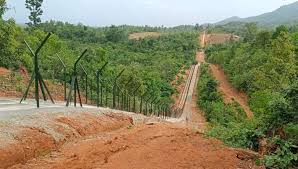Manipur Deports 26 Myanmar Nationals Entering Through Porous Borders
On January 5, 2025, Manipur Chief Minister N Biren Singh announced the deportation of 26 Myanmar nationals who had entered India through the state’s porous borders. This action underscores the state’s commitment to addressing illegal immigration while providing humanitarian assistance to those fleeing conflict.
Understanding the Context: Manipur’s Geopolitical Landscape
Manipur, a northeastern state of India, shares a 398 km border with Myanmar. This extensive boundary, characterized by rugged terrain and dense forests, has historically facilitated cross-border movement. The Free Movement Regime (FMR) allowed tribal communities residing along the border to travel up to 16 km into each other’s territories without visas. However, the suspension of the FMR and plans to fence the entire 1,643 km Indo-Myanmar border aim to curb illegal immigration and smuggling activities.
The Influx of Myanmar Nationals
The political turmoil following Myanmar’s military coup in February 2021 led to a significant influx of refugees into neighboring Indian states, particularly Manipur and Mizoram. Ethnic ties between communities across the border have further complicated the situation, with many seeking refuge among their kin in India. As of February 2024, Manipur detected approximately 6,746 illegal Myanmar nationals within its territory.
Manipur’s Stance on Illegal Immigration
The Manipur government has adopted a firm stance against illegal immigration, emphasizing the need to maintain law and order. While the state provides humanitarian assistance to those fleeing conflict, it insists on the dignified departure of illegal migrants. The recent deportation of 26 Myanmar nationals reflects this policy. Chief Minister N Biren Singh stated, “The Government of Manipur reaffirms its commitment to providing humanitarian assistance to those fleeing war, ensuring their care and dignified departure. However, the state maintains a firm stance against allowing illegal migrants to stay back in Manipur.”
Operational Challenges in Deportation
Deporting illegal immigrants involves complex logistics and coordination between various agencies. The process includes identifying illegal entrants, ensuring their safety, and coordinating with Myanmar authorities for their return. The recent deportation was executed with adherence to ensuring the individuals’ safety and dignity throughout the process.
Humanitarian Concerns and International Implications
While addressing illegal immigration, the Manipur government balances humanitarian concerns. India, though not a signatory to the 1951 Refugee Convention, has historically provided refuge to those fleeing persecution. The state’s actions aim to uphold this tradition while ensuring compliance with national laws. The international community continues to monitor the situation, emphasizing the need for humane treatment of refugees and adherence to international human rights standards.
Future Implications for Border Management
The recent deportations highlight the challenges in managing India’s northeastern borders. The suspension of the FMR and plans to fence the border indicate a shift towards stricter border control measures. Additionally, Manipur’s proposal to implement a National Register of Citizens (NRC) exercise reflects efforts to identify and manage illegal immigration systematically. These measures aim to enhance security but also raise concerns about their impact on cross-border ethnic communities and traditional ties.
Conclusion
Manipur’s recent deportation of 26 Myanmar nationals underscores the state’s commitment to addressing illegal immigration while balancing humanitarian obligations. The complex geopolitical landscape, coupled with ethnic and cultural ties across borders, presents ongoing challenges in border management. As the situation evolves, Manipur continues to navigate the delicate balance between security concerns and humanitarian responsibilities.
FAQs
- Why did Manipur deport the Myanmar nationals?
- The individuals entered India illegally through Manipur’s porous borders. The state maintains a firm stance against illegal immigration while providing humanitarian assistance to those fleeing conflict.
- What is the Free Movement Regime (FMR)?
- The FMR allowed tribal communities along the India-Myanmar border to travel up to 16 km into each other’s territories without visas. Its suspension aims to curb illegal immigration and smuggling activities.
- How does Manipur balance security and humanitarian concerns?
- While the state provides refuge and assistance to those fleeing conflict, it insists on the dignified departure of illegal migrants to maintain law and order.
- What challenges does Manipur face in border management?
- The state’s extensive and porous border with Myanmar, coupled with ethnic ties across borders, complicates efforts to control illegal immigration and smuggling.
- Whalans for managing the India-Myanmar border?
- Plans include fencing the entire border and potentially implementing a National Register of Citizens (NRC) exercise in Manipur to systematically identify and manage illegal immigration.



